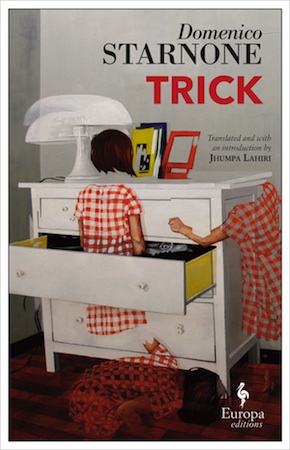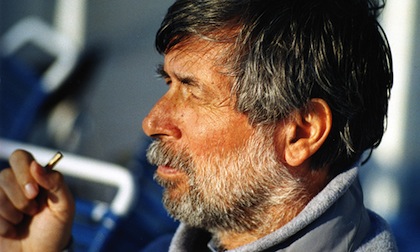Illustrations for a life unlived
by Mika Provata-Carlone
“A maestro translated by a maestra. What more could anyone want?” Jeffrey Eugenides
“When I was twelve, other people thought I was a prodigy who dazzled and disturbed… by the time I was twenty, I’d learned to deride the facility of my hands as if it were a weakness.” Daniele Mallarico, who speaks these words, is a renegade Neapolitan, an old man on the edge of the precipice of life, a father who delegated parenthood to the abstraction of a wife he never really knew, an illustrator who gained fame by taming the overflowing fountain of his talent into a cistern that merely (yet successfully) contained – a Wildman turned into a Jamesian enigma.
After his wife’s death, he lives a solitary life filled with the agon not to be forgotten, not to become transparent or invisible, redundant, quiet, unraging. He has just come out of hospital following an operation that has forced him to confront (though not to accept) mortality, and he now faces what is perhaps the greatest challenge in his artistic and personal life: he must find a way to illustrate one of Henry James’ most allusive and elusive stories, The Jolly Corner, for a deluxe edition as “vulgar and sordid” as Spencer Brydon’s property investments. He must also take care, on his own, of his four-year old grandson in the Naples apartment he grew up in, and deal with the traumas, dark corners and absurdity of many real or fictional lives.
Trick (perhaps another translation for Scherzetto would have been Grotesque, for the grotesqueness, the laughable horror – or tragic ludicrousness – of our lives is what the novel is all about) is essentially an epic katabasis, an apocalypse and a revelation rolled into one. Elemental, inspired talent is pitted against harnessed, trained aptitude and savvy manoeuvrings of trends and fashions; rustic humanity is corseted and preened into a refined and almost infinite loneliness. Starnone too can be said to possess prodigious, dazzling and disturbing powers as a writer, and here he gives them absolute freedom of triumph and disaster. He has a sharp eye for picking out the elementals, for conjuring up a stage for the ultimate, simplest, in many ways direst commedia. There is an eerie sense of Kundera-like questions lurking in the background, together with the fluidity and introspection of narrative that the earlier Kundera, of The Unbearable Lightness of Being, The Joke, or Immortality could muster. Here too are characters perched between a bourgeois and a less standardised world, who rattle the reader with their visceral needs and existential epiphanies, their materiality and their philosophical digressions, their determination for Nietzsche-like vim and a more pejorative, romanticised gesture of resignation.
Rage is the ineffable force of humanity at its most primal, fundamental, unadulterated, we are told, a demonic force taking characters and readers into a descent to the depths of the soul, the mind and existence.”
As generations meet, converge, clash and tangentially separate, the past (or the present) wage mortal battle with the future, as does old age (its purported wisdom and perspective) with youth (authority of new money, of image control, of narrative and existential direction). It seems the propositions are a mutually exclusive either/or, with no compromise, no catalysing hope, except for a fusing, welding, amorphous-making rage – a word Starnone picks from James, but also from Homer and Achilles, and the Naples that moulded his soul. Rage is the ineffable force of humanity at its most primal, fundamental, unadulterated, we are told, a demonic force taking characters and readers into a descent to the depths of the soul, the mind and existence – an old man’s rites of passage almost beyond life, a city’s ghostly future beyond its past and into a prosperous future as an expurgated tourist heaven, mythologised and carefully retouched, a trail of ordinary everyday lives that must learn to live on the surface of a lie, of illusion, or perhaps more simply of perseverance and an acknowledgment of limits, of duties and not just desires.
Mallarico’s return to Naples, to the inaugural moment of artistic creation, to the starting point of a human relationship (with his grandson, daughter, son-in-law, with James’ characters and the ghosts in his own life), is a journey back to origins he has long disclaimed, a nostos as painful as it is vital, inevitable, yearned for. Everywhere on the way there are lives and people that are “what remained of a possibility”, as opposed to “life in its definitive form, in its duration”. Mallarico has eluded the representational in life as much as in art, and now, when it should be the culminating end of a long, successful career in wanderlust, abstraction and ambiguity, he is thrown into what seems to be a circus pit full of perfectly famished beasts: the terrifying concreteness of another human being; the underlying bonds and boundaries of relationships; the paralysing fear of relinquishing force and exposing one’s fragility; the magnitude of metaphor and reality in words, plots and images once one tries to capture them with evocative precision; the precarious balancing act of showing without perverting, of liberating without unleashing the barbaric, of relating without subjugating or dominating. The question of how to draw out the essence of James’ story in order to encapsulate it in an image, an illustration, a fixed point of vision, of time and the mind, becomes a cautionary tale: beware of both blindness and sight, of knowledge and ignorance, of closeness and errantry.
The plot of Starnone’s story (a novel-length novella, in fact) might, on the surface, appear claustrophobic, a tense, staccato-like three-act sketch that exhausts the emotions as much as it captivates the whole of one’s existence. Whether one traces the lines that join the dots connecting Trick with The Jolly Corner (or equally The Turn of the Screw), or stays on the surface of fiction and reality, this remains a tale of cutting juxtapositions, a human aporia that even the appended artist’s diary cannot – or will not – resolve. It creates a space and characters that are constantly visited or invaded by a wider humanity clamouring for attention, connections, inclusion, while experiencing a devastating revulsion against the simple act of acceptance and renunciation that this would entail.
Innocence and experience are exposed in all their darkness and futility – “the delighted violence that gurgled from that wide-open mouth, exposing tiny teeth, disturbed me,” shudders Mallarico, when the seemingly angelic, precociously sapient Mario transforms into an unhappy domineering toddler with troubling symptoms of emotional neglect. James’ story, which increasingly supplements the choreography of a danse macabre between grandfather and grandson, becomes the story of the ghostliness (or the uncanniness) of an everyday life bereft of human attachment and meaning, of the defleshing and dematerialising of lives, of the insubstantiality of what we tolerate as our state of being. At the same time, the psychological analysis, the portrayal of characters, dynamics, forces of being or annihilation, are brutally palpable, scathingly piercing, unrelenting and almost irresistibly effective.
Trick is a book of ample richness that feels burningly alive in one’s hand, and also one that wisely avoids clever or facile gothic thrills and artifices… it leaves the reader both distraught and engaged, ragged and attentive.”
Starnone questions our notions of greatness, power and uniqueness, or the veneer we apply to our universe, using reflecting mirrors that are both perfect and eschewed, foil characters that clash as much as they converge, exposing the savage side hidden behind manners, mannerisms and a parroted hierarchy of culture, values, social history, but also revealing the power of art (in any form) in capturing the quintessence of life. Grandfather and grandchild are finally linked by the umbilical cord of drawing, and one last image on paper will become the ghost that is the starkest figure in the carpet. Like Braque and Picasso, they will sign each other’s work, so that no one can tell the difference, the child copying the ghost of true genius the grandfather never dared to embody. It is a game, a joke, a grotesque reversal and destiny, a coup de grâce or perhaps a promise of continuity and regeneration. Jhumpa Lahiri has clearly relished translating, or rather relocating the story in English, with flourish and whirlwind-like impulse; her introductory essay is masterfully lyrical, raising an evocative edifice of literary associations and metatextual relations, as well as offering a meditative commentary on the poetics of writing and translating, the dialectics between authors and books, readers and cultures, especially between moments in time and being. Trick is a book of ample richness that feels burningly alive in one’s hand, and also one that wisely avoids clever or facile gothic thrills and artifices (perhaps the appendix without the sketches would have been even more poignant?). In exchange, it leaves the reader both distraught and engaged, ragged and attentive. Not quite a mystic rose at the end of this human comedy, but certainly a garden full of both wild and more cultivated flowers.
 Domenico Starnone was born in Naples and lives in Rome. He is the author of thirteen works of fiction, including First Execution (Europa, 2009), Via Gemito, winner of Italy’s most prestigious literary prize, the Strega, and Ties (Europa, 2017), a New York Times Editors’ Pick. Trick, translated and with an introduction by Jhumpa Lahiri, is published in paperback and eBook by Europa Editions.
Domenico Starnone was born in Naples and lives in Rome. He is the author of thirteen works of fiction, including First Execution (Europa, 2009), Via Gemito, winner of Italy’s most prestigious literary prize, the Strega, and Ties (Europa, 2017), a New York Times Editors’ Pick. Trick, translated and with an introduction by Jhumpa Lahiri, is published in paperback and eBook by Europa Editions.
Read more
@EuropaEditions
Jhumpa Lahiri is a Pulitzer Prize-winning author whose fiction includes Interpreter of Maladies, The Namesake, Unaccustomed Earth and The Lowland. A recipient of Guggenheim and National Endowment for the Arts Fellowships, she was inducted into the American Academy of Arts and Letters in 2012. Her non-fiction includes In Other Words and The Clothing of Books. She lives in Brooklyn.
Mika Provata-Carlone is an independent scholar, translator, editor and illustrator, and a contributing editor to Bookanista. She has a doctorate from Princeton University and lives and works in London.

